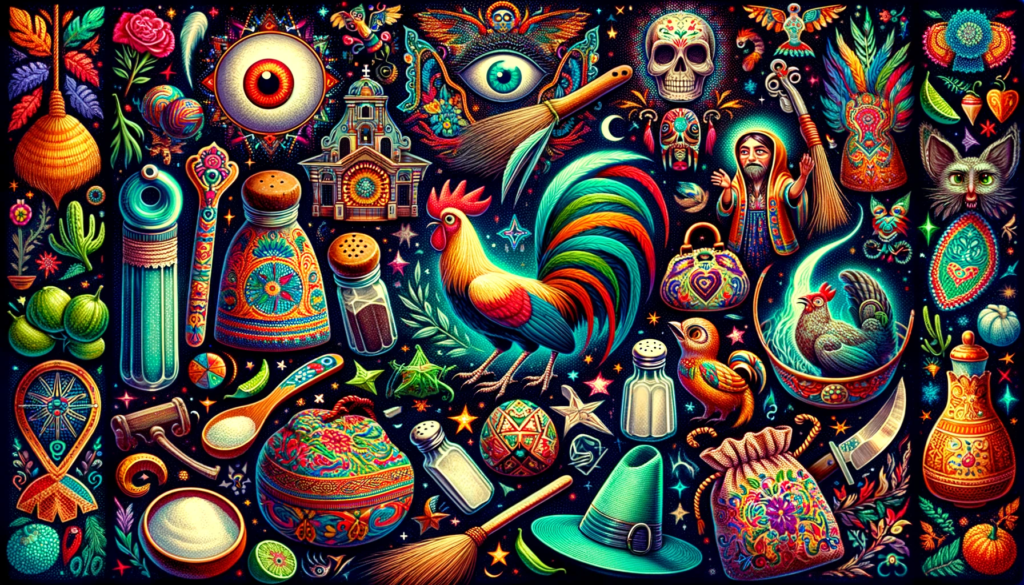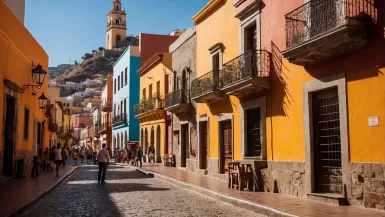
Superstitions of Mexico can be strange. But, Have you ever found yourself knocking on wood for good luck or crossing your fingers in anticipation? Well, these are just a glimpse into the captivating world of superstitions, and Mexico has its fair share of enchanting beliefs. From warding off the evil eye to predicting the weather with knives, Mexican superstitions add a touch of magic to the lives of countless individuals across this diverse country.
In this article, we’ll delve into the fascinating world of Mexican superstitions, exploring the customs and traditions that shape the beliefs of the Mexican people. So, grab your sense of curiosity and join us on this mystical journey.
The Evil Eye: Protecting Against Envy

In Mexican culture, the evil eye, known as “el mal de ojo,” is a belief that envious glances can bring harm to individuals, especially babies and small children. To ward off this malevolent gaze, many people carry a small amulet called a “mano de azabache” or use red ribbons as protective charms. These talismans are thought to deflect negative energy and keep the evil eye at bay.
Crowing Roosters: Omens of Death

One of the best-known Mexican superstitions is the belief that the crowing of a rooster at night is an omen of death in some regions. Roosters are seen as protectors of the home, and their nighttime crowing indicates a disturbance in the natural order. This superstition is deeply rooted in Mexican folklore and highlights the connection between animals and mystical beliefs.
Purses on the Floor: Inviting Financial Misfortune

In Mexican superstitions, placing your purse on the floor is seen as an act that can cause your money to “run away” or be lost. It’s believed that doing so invites financial misfortune into your life. To safeguard your finances, it’s common to see people carefully hanging their purses on the back of their chairs or finding elevated spots to keep them off the ground. It’s a simple practice that reflects the desire to protect one’s wealth and luck.
Passing the Salt: Avoiding Bad Luck

In Mexican superstitions, passing the salt directly from hand to hand is believed to invite bad luck or provoke a quarrel. Instead, it’s customary to place the salt close to the person on the table, allowing them to pick it up themselves. This symbolic act aims to avoid any potential negativity and ensure harmony around the dining table. It’s a small gesture that showcases the importance of maintaining positive energy in interpersonal interactions.
Putting Saint Anthony Upside Down: Seeking Love’s Intervention

When it comes to matters of the heart, some people turn to Saint Anthony for celestial matchmaking. In Mexican superstitions, it’s believed that flipping the saint’s statue upside down can inspire him to work his miracle-making magic in the realm of love. This playful inversion of the saint’s figure symbolizes the desire for romantic intervention and hope for finding love.
Sweeping Single Women’s Feet: A Bad Omen for Romance

In Hispanic and Mexican superstitions, sweeping the feet of single women is seen as a bad omen for their romantic prospects. It is believed that this act sweeps away their chances of finding love and happiness in marriage. While it may seem like a simple gesture, it reflects the cultural significance attached to sweeping and its impact on one’s love life.
Sweeping at Night: Inviting Misfortune

In Mexican superstitions, sweeping the house after sunset is seen as a bad omen. It’s believed that sweeping at night invites misfortune through the front door with each stroke of the broom. This quirky belief portrays the broom, typically a symbol of cleanliness, as a troublemaker at night. To avoid any late-night misfortune, it’s best to let the broom rest and save cleaning for daylight hours.
Sticking Knives in the Ground: Warding off Rain and Storms
Another Mexican superstition involves sticking a knife into the ground to influence the weather. It’s believed that this practice can ward off rain and storms, protecting crops and ensuring a fruitful harvest. Farmers, in particular, would use this method to safeguard their livelihoods and ensure favorable weather conditions. This ancient tradition showcases the resourcefulness and ingenuity of Mexican agricultural communities.
Crossing Knives: Seeking Clear Skies

In Hispanic and Mexican superstitions, when rain persists, people turn to a quirky ritual involving knives. By stacking two knives in the shape of a cross and praying to San Isidro Labrador, the Catholic patron saint of agriculture, they hope to persuade the skies to cooperate. This unique belief demonstrates the deep connection between faith, nature, and human desires for favorable weather conditions.
Things Taken by Goblins: Mysterious Disappearances
According to some Hispanic superstitions, mysterious disappearances can sometimes be attributed to mischievous goblins. These little troublemakers are believed to sneak into homes and rearrange or hide belongings just for fun. When keys end up in unexpected places or objects go missing, some people playfully blame these elusive creatures. It’s a whimsical explanation for the unexplainable, adding a touch of enchantment to everyday life.
Itchy Palms: Celestial Messages of Fortune
In Hispanic and Mexican superstitions, itchy palms hold cosmic significance. When your right palm itches, it’s believed to signal a forthcoming money infusion, suggesting financial fortune is on its way. Conversely, an itchy left palm is seen as a cautionary sign, indicating money slipping through your fingers. These tingling sensations serve as celestial telegrams, offering insights into one’s financial destiny.
Hot Ears: Whisperings from the Universe
Have you ever experienced your ears suddenly turning red and heating up? According to Hispanic and Mexican superstitions, this isn’t merely a physiological quirk but a cosmic nudge. A red left ear suggests someone is saying negative things about you, while a red right ear signifies that you’re being praised. These peculiar reactions reveal the belief in an unseen world, where whispers can be felt through physical sensations.
Knocking on Wood: Warding off Bad Luck
“Tocar madera” or knocking on wood is a widespread superstition practiced to ward off bad luck. It’s a reflexive action taken when making a statement or prediction that one hopes will come true. By quickly tapping or knocking on a wooden surface, individuals ensure that their words remain jinx-free. This simple ritual reflects the desire to protect one’s hopes and dreams from the influence of negative forces.
Wet Paper or Cotton for Babies’ Hiccups: Charming Remedies
When a baby is plagued by hiccups, some turn to a quirky but beloved remedy involving wet paper or cotton gently placed on the baby’s forehead. This enchanting practice is believed to have the power to stop hiccups in their tracks, offering much-needed relief to the little one. It showcases the ingenuity and tenderness of Mexican traditions when it comes to caring for infants.
Eating 12 Grapes on New Year’s Eve: Sprinkling Fortune
A well-known and fun Hispanic tradition is eating 12 grapes on New Year’s Eve. As the clock strikes midnight, surrounded by loved ones, individuals hold 12 grapes, one for each stroke of the clock. With each chime, they eat one grape, making a wish or setting an intention for each grape. This ritual symbolizes the sprinkling of good luck for each month of the upcoming year, embracing optimism and prosperity.
Walking with a Suitcase on New Year’s: Ready for Adventures
Another playful New Year superstition involves taking a stroll with a suitcase. Some people even take their passports with them for added effect. By doing so, they whimsically convey their readiness to embark on exciting travels in the coming year. It’s a lighthearted way to express the desire for new experiences and adventures.
Wearing Yellow Underwear: Inviting Positivity
In the realm of Hispanic and Mexican superstitions, even the choice of underwear can be a delightful ritual, especially on New Year’s Eve. Many people choose to wear yellow underwear, associating it with joy, optimism, and happiness. Wearing yellow is believed to invite good fortune and positivity into one’s life, setting the tone for a prosperous year ahead.
Conclusion: Embracing the Magic of Mexican Superstitions
Congratulations on embarking on this mystical journey through the world of Mexican superstitions! We hope you’ve enjoyed uncovering the fascinating beliefs and traditions that shape the lives of the Mexican people. These customs, whether warding off the evil eye or inviting good luck, add a touch of enchantment to everyday life. They remind us of the rich cultural diversity that makes Mexico a captivating and vibrant country.
As you continue your own journey, remember to embrace the magic of superstitions and the stories they tell. Whether you’re knocking on wood or wearing yellow underwear, these practices connect us to a shared sense of wonder and belief. So go forth, explore, and let the magic of Mexican superstitions guide your path.
Additional Information: To learn more about Mexican culture and traditions, consider immersing yourself in Spanish language classes in Mexico. By experiencing the local customs firsthand, you’ll gain a deeper understanding of the beliefs and superstitions that shape the Mexican way of life.
Subscribe to our newsletter to receive more articles on fascinating cultural topics and travel inspirations.





